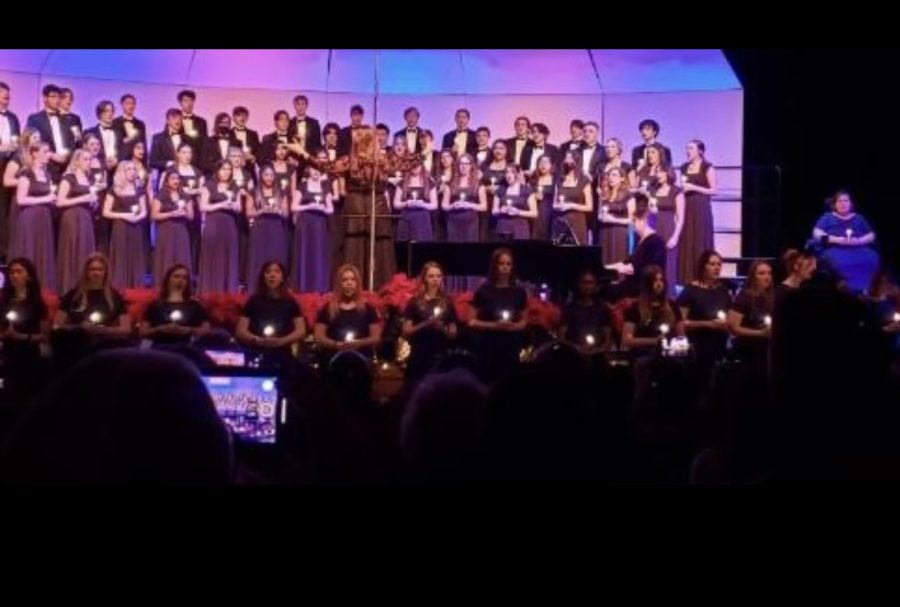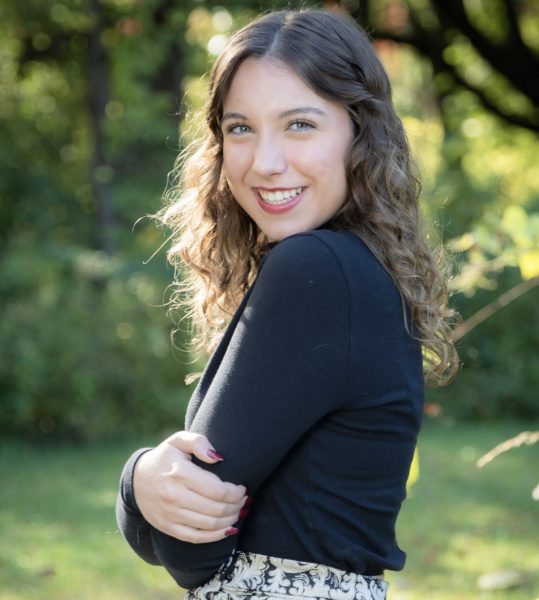What Happened?
The Spring Choir Concert held on May 15 was a joyous event meant to celebrate PV Choirs’ successful year and honor graduating seniors. From beginning to end, this celebratory spirit was alive as awards were presented, songs were performed and memories were recalled.
However, one choir member was excluded from the festivities by no fault of her own.
Junior Lynsey Stevenson is a choir member who uses a wheelchair. On the evening of this concert, the handicap-accessible door was locked, leaving her unable to access the stage. She attempted to access the stage from other doors, but each she tried was locked.
Once Stevenson made it backstage for the first time, she recollects being told by a choir director that there was no space on the stage for her, and she had to remain in the wings. Another student in a wheelchair was also placed offstage during her songs; neither could be seen from the audience.
By the final song, Stevenson found a steff member and was instructed to go down an aisle in the theater and complete the song on the floor, in front of the stage, separated from her peers.
“I felt like I was just a shadow,” Stevenson shared, “like I wasn’t even there.” In pictures from the evening, she looks like exactly that, merely an outline of a person in the background.
For Stevenson, the oversight was more than an inconvenience. “At first I was more upset that they didn’t even think about people in wheelchairs… and then I was like, ‘This is just so wrong,’” she explained. This sense of injustice was exacerbated by Stevenson’s knowledge of the Americans with Disabilities Act, which mandates accommodations for students with special needs.
Megan Ramirez, whose daughter Madi Ramirez was also excluded from the concert, took to Facebook to lament the evening’s mishap. “I’m saddened by all of this and that people in charge don’t care enough to plan things like this ahead of time,” Ramirez wrote in her post the day after the concert.
This isn’t the first time a handicapped student was excluded at a choir event due to accessibility problems. In 2019, a parent went to a local news source after her daughter was left offstage during a choir concert because the wheelchair ramp was lost. The family was reassured that this was a one-time event, and would not happen again, yet history has revealed a much broader problem.
Stevenson does not believe issues of inaccessibily at Pleasant Valley are limited to concerts.When she arrives to the choir room for class each day, she is unable to open the door, and must wait for another student to let her in. Small instances like these seem trivial, but when inaccessibility becomes a theme, the significance becomes much greater.
School response
From an administrative standpoint, the logistics of what happened at the concert are ambiguous at best. In a conversation with PV principal Darren Erickson and choir directors Catherine Lyon and Meg Byrne, they stated at one point that the door was, “potentially locked,” before later sharing it might have been jammed instead, and specifying that “people went in and out of that door all night.”
Byrne feels that the reason for the evening’s poor execution is that, for 28 years, the final choir concert has gone off without a hitch. “I perhaps didn’t expect anything of this sort,” Byrne explained. But for an event so frequently repeated, it is far from a well-oiled machine. Erickson explained the problem, saying, “I wish we could have laid out the event differently, but they didn’t have the tools to do so.”
As for the moment when Stevenson was told to remain backstage, administration denies it entirely. Erickson explained that, “All the kids got up there and the space was so tight… there were several students over to the side that weren’t as visible as we would have liked.” They recall Stevenson being on stage, but not visible because of the size of her choir.
All affected students received personal apologies, as did their parents. Byrne and Lyon believe those conversations mended relationships and quelled emotions. In conversation with those directly affected, however, negative feelings seem to be far from resolved.
Choir directors and administration say they will continue to have proactive conversations. It has been suggested that hiring a backstage director, providing more rehearsal time, or moving the venue of the concert might prevent inaccessibility in the future.
Conclusion
Stevenson was eager to point out the PV mission statement, which states that the district strives to have the best programs in the state, “Not for some kids but for all kids.” By denying students with disabilities the opportunity to sing on stage with their classmates, the choir fell exceptionally short of this mission.
By speaking up about her own difficulties, Stevenson hopes to make change so future students don’t have to go through what she has. “I just don’t want that [feeling] for future people in wheelchairs… I have a little sibling in choir, and I’m hoping that he can do choir and not have to have these hurdles.”
Erickson was quick to point out that no individual can be held culpable for the events of the evening. “I don’t want to place any blame, no one’s happy,” he said. Indeed, the actions of choir directors are not the problem here; their inaction is. If there had been greater foresight in the concert’s organization, something as simple as a doorstop could have prevented the disappointment that ensued.
Accessibility is necessary to creating an inclusive environment within PV and all of its programs. When I began to address the topic, I was hopeful that PV choir would recognize its mistakes and move forward with a desire to change. While no negative intentions were ever present, the school’s response felt more defensive and less receptive. Teachers are apologetic, yet seem to be more upset about being called out than that the mistake happened in the first place.
The mistakes made cannot be attributed to any individual, but denying culpability creates a lack of accountability. Very little, if any, foresight was given to the multiple students in wheelchairs when planning this concert. And, the event continued even when it became clear that Lynsey was unable to get on stage.
Going forward there is hope for change, but Stevenson isn’t holding her breath. After three full years at the high school, and even more in choir, Stevenson said she feels used to not receiving fair accommodations, but that doesn’t mitigate her frustration each time a new injustice occurs. PV has reached a point where simple apologies are no longer enough; only once a lasting solution is implemented can trust truly be restored.











Bella • Sep 10, 2023 at 9:54 pm
I think that our school has a lot of work to do when it comes to people with disabilities. We need to be making a lot of changes that help accommodate to people that can’t access things as easily as others.